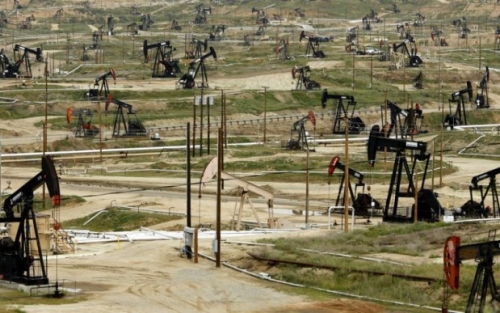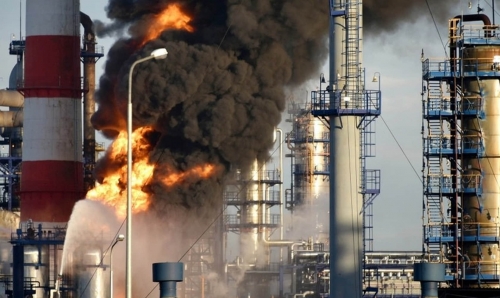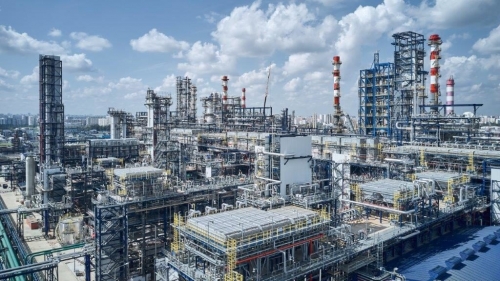Two of the world's biggest oil producing countries are coping with the slide in crude in sharply divergent ways.
Stubbornly cheap oil prices — which this week probed their lowest levels since August despite OPEC's best intentions — have created a new world order for crude production powerhouses like Russia and Saudi Arabia.
Although the latter is pursuing a bold reform agenda, punctuated this week by a dramatic leadership shake-up, the former copes by flexing its geopolitical muscles in a way that successfully diverts from economic worries at home.
A Pew Research poll published this week revealed a few cracks in President Vladimir Putin's Teflon on domestic issues. Although Putin retains overwhelming majority support, his ratings on energy policy and the economy have fallen by double digits over the last two years, Pew found.
With oil still firmly hunkered under $50 per barrel, "Saudi Arabia was in a better position going into this downturn in oil prices," Win Thin, global head of emerging market currency strategy with Brown Brothers Harriman, told CNBC recently.
"Despite promises to diversify for years (if not decades), the country remains highly dependent on oil and natural gas exports. These still account for two-thirds of total exports," Thin added.
Pew's data were the latest reminder that Russia's economy, while recovering from a deep recession amplified by international sanctions, remains sluggish at best. It grew by a marginal 0.5 percent in the first quarter — even as Russia flexed it geopolitical muscles in Syria and partnered with OPEC to curtail oil's steep slide, to little discernible effect.
Just last week, Putin told a question and answer session that Russia's economic was over. Despite international sanctions that walloped the economy last year, Russia "has moved to a period of growth," Putin insisted.
However, economists note Russia's susceptibility to swings in global crude prices loom large over its economy. In May, a World Bank report said Russia's "growth projections remain sensitive to oil prices" and reform remains elusive.
"Despite policy efforts to reduce sensitivity, oil price volatility [will] still affect consumer and producer sentiments," the bank said. "We expect a slightly higher response of the economy to the upper oil price variation due to improved investor sentiments."
To be certain, Russia — one of the world's largest oil producers — has made efforts to diversify away from oil, but the economy's make-up makes change a daunting prospect.
Unlike Saudi Arabia, diversification efforts are running headlong into structural constraints that are a headwind for growth, economists say. Out of Russia's top 10 exports, eight are commodities-related, according to an analysis by global credit insurer Coface, which forecasts Russian growth won't exceed 1 percent this year.
As opposed to other emerging markets that can devalue their currencies when their economies hit the skids, Russia's ruble has not proven to be as useful an escape valve. Relatively high interest rates have kept risky trades attractive for investors, and limited the petro-currency's downside.
The ruble's relative strength "suggests the central bank of Russia may cut [interest rates] more than expected over the next year," said Rachel Ziemba, managing director of emerging markets with 4CAST-RGE.
"Weak oil, higher external debt repayments and greater finance ministry interventions in the foreign exchange market are what to watch," she said, forecasting the ruble — which hit its weakest level this week since November — will weaken further this year.
Analysts say Russia's reform priorities remain within the areas of governance, labor market policies, innovation and infrastructure. As has been the case with the Saudis, Moscow may be able to right the domestic economy by investing in new ideas and innovation that can spur growth, as well as offer buffers during oil price volatility.
Still, Russia watchers harbor deep doubts about whether Moscow will be able to jump-start growth appreciably ahead of 2018's presidential elections. Andrey Movchan, director of the Economic Policy Program at the Carnegie Moscow Center, said in a recent analysis that Russia faces a "bleak" outlook despite the tentative recovery.
"The Russian government has chosen not to tackle economic challenges by reforming the economy. Instead, it has focused on maintaining the budget deficit at its current level in the short term, in part at the expense of long-term development," Movchan wrote. "The government's main strategy is to raise tax revenues and cut public spending."
Factors such as a tightly held government and other social issues could hold the country back, contrasting sharply against Saudi Arabia whose reform initiatives have been better received both domestically and internationally.
"Judging by the current state of public opinion [in Russia], future changes are likely to include stricter political control, further nationalization of private property, further shutting down the economic space, and new processes that make economic transactions in the country less sophisticated and more inefficient," Movchan said.

%20(1).png)



